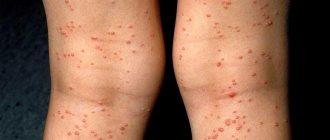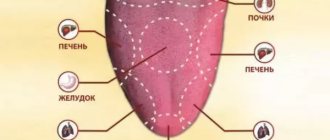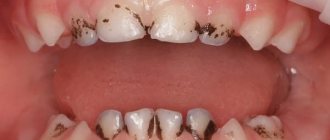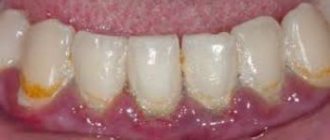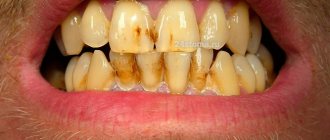A change in the color of the child's tongue surface makes parents in earnest worry.
There is no need to panic right away - black coating on the tongue in children is not always pathological .
Why might it appear?
Keep in mind! Most often, a child’s taste organ darkens for the following reasons:
- Eating large amounts of food containing natural or synthetic dyes . Candies, tea, lemonade, dark berries (currants, blackberries, blueberries, mulberries), as well as jams and compotes based on them, can color your tongue dark.
- Taking certain medications. This organ is often colored dark by iron preparations in the form of drops, which are prescribed to the baby to treat anemia. Also, the color of the taste organ often changes during prolonged treatment with antibiotics, or when taking activated carbon.
In rare cases, the tongue darkens for reasons unknown to modern medicine.
Thus, the surface of the taste organ may darken due to excessive growth of the papillae of the tongue, followed by their keratinization and darkening .
Stay up to date! This phenomenon is called “villous tongue”; in the absence of complaints, special treatment is not required, and the condition of the taste organ is normalized within a few weeks.
Less commonly, the cause of darkening of a child’s tongue is various pathological conditions of organs and body systems:
- gastritis;
- colitis;
- enteritis;
- pathologies of the gallbladder and pancreas;
- acute deficiency of B vitamins and vitamin PP;
- dysbacteriosis;
- stomatitis;
- caries;
- oral candidiasis;
- Crohn's disease;
- lead poisoning;
- immunodeficiency, HIV;
- severe dehydration;
- infectious diseases of the upper and lower respiratory tract: sore throat, ARVI, bronchitis.
Note! The cause of dark plaque in a baby can also be acidosis - a shift in the acid-base balance of the body towards increasing acidity.
Types of black tongue and its causes
If the tongue seems to be covered with black dots, or looks “speckled”, then the cause of this phenomenon is most often:
- damage to the oral cavity by a fungal infection (if this is not dealt with, the tongue will soon turn completely black);
- exacerbation of chronic diseases of the digestive system;
- lead poisoning (Remak's disease).
The appearance of a large black spot that increases in size may indicate:
- exacerbation of an existing chronic disease;
- complications after colds;
- malfunctions of the abdominal organs;
- genitourinary infections.
It happens that the entire tongue is covered with a black coating and even the enamel of the teeth acquires a green-black tint. Typically, such symptoms require visiting two doctors at once: a dentist and a therapist.
Acidosis
Acidosis can be caused by dehydration, diet, excessive sugar consumption, alcohol, intoxication, treatment with a number of drugs, etc. In addition to plaque on the tongue, acidosis is accompanied by nausea, malaise, shortness of breath, and high blood pressure.
What to do. Acidosis is not a disease, but it can accompany many diseases and lead to serious problems in the body - heart attack, thrombosis, etc.
Angina
Plaque on the tongue with sore throat is very common. Usually this condition is accompanied by high fever, sore throat, weakness, and headache.
What to do. It is fraught with complications in the form of peritonsillar abscess, myocarditis, pyelonephritis, rheumatism, etc. A sore throat can be one of the symptoms of a fungal infection, influenza, infections (diphtheria, measles, scarlet fever), diseases of the hematopoietic organs (leukemia, agranulocytosis, etc.) Therefore, any sore throat requires serious attitude and treatment.
Avitaminosis
Lack of vitamin PP leads to hemorrhagic disorders of the stomach, intestines, and vagina. In addition to a black coating, vitamin deficiency may cause the tongue to peel or ulcerate. Similar disturbances occur in internal organs.
What to do. It is necessary to find out the cause of vitamin deficiency, improve the functioning of the gastrointestinal tract and introduce foods with vitamin PP into your diet (fish dishes, offal, green vegetables, etc.)
Antibiotics
Antibiotics are often the cause of blackening of the tongue. Self-medication and the habit of taking antibiotics for any pimple on the face are especially dangerous. Antibiotic therapy should be supported by B vitamins and probiotics.
What to do. Reproduction of fungal flora requires treatment with antifungal drugs, restoration of microflora and increased immunity (at least 2 weeks). At the same time, it is necessary to clean the tongue with a toothbrush and rinse the mouth with propolis, nystatin or herbal mixtures.
Diseases of internal organs
The tongue is the first section of the digestive system. Changes in its appearance often signal a problem in the entire system.
Digestive pathologies can provoke signals in the form of a feeling of bitterness, rotten belching, nausea, pain in the hypochondrium after eating. The range of diseases can be extensive - from dyskinesia, cholecystitis, pancreatitis, to stomach or duodenal ulcers, etc. The most dangerous disease in this case is cirrhosis of the liver.
What to do. It is necessary to undergo a serious examination by a doctor (general blood and urine analysis, blood biochemistry, fibrogastroscopy, etc.).
Fungal infection
A black tongue can be an indicator of a fungal infection, more often thrush. If the plaque is not white, but dark, this indicates that the process is neglected.
Often, oral thrush is combined with intestinal dysbiosis and vaginal candidiasis. May occur after long-term treatment with antibiotics, abuse of sweet or starchy foods.
What to do. If untimely or ill-treated, thrush can become chronic.
Renal dysfunction
When black plaque is combined with urination disorders, lower back pain, and swelling, renal dysfunction can be suspected.
What to do. You will need to see a specialist to rule out kidney disease. In this case, a series of urine and blood tests and an ultrasound of the kidneys are prescribed. Kidney diseases are dangerous due to complications in the form of chronic renal failure.
Crohn's disease
This rare disease is associated with autoimmune disorders.
The reasons are related to:
- decreased adrenal function;
- increased melanin content in the skin and mucous membranes;
- inflammation of the digestive organs.
With Crohn's disease, the tongue often becomes completely black.
What to do. Here you cannot do without tests and medical supervision. The treatment regimen usually includes antibiotics, hormonal drugs, and immunosuppressants.
Remak's disease
Remak's disease occurs due to lead poisoning. Additional symptoms: abdominal pain, dark gray border on the gums, metallic taste in the mouth.
What to do. Urgently eliminate contact with lead and begin treatment.
Associated symptoms
If a black coating is detected on the child’s organ of taste, you should pay special attention to the child’s accompanying symptoms and complaints.
Possible symptoms:
- nausea and vomiting;
- diarrhea with particles of undigested food;
- loss or abnormal increase in appetite;
- stomach ache;
- dry or bitter mouth;
- weakness;
- temperature increase;
- headache;
- redness of the mucous membranes of the mouth and tonsils;
- pain when swallowing.
It is worth noting! Sometimes, even in the presence of dark gray and black deposits on the tongue, the child voices absolutely no complaints.
The complete absence of accompanying symptoms is characteristic of fungal infection of the mucous membranes of the mouth, as well as when plaque occurs for non-pathological reasons.
The baby's tongue has turned black
If the baby’s tongue suddenly turns black, but he hasn’t eaten or chewed anything, then the plan of action is obvious. Any such manifestation in children should be a signal to consult a doctor.
As a rule, the doctor in this situation will examine the child and begin by ordering “basic” tests such as a general blood test, urine test and ultrasound of internal organs.
There can be many reasons for a black coating on the tongue. And if this manifestation was not the result of banal contact with food dyes, then there is no need to delay revealing its causes.
Sources used:
- James, William D.; Berger, Timothy G.; et al. Andrews' Diseases of the Skin: Clinical Dermatology. — Saunders Elsevier, 2006.
- Notes of a good dentist / E.G. Aghajanyan. - M.: Omega, 2011.
- Northwestern State Medical University named after I. I. Mechnikov
- Treatment of diseases of gums and teeth using traditional and non-traditional methods / E.L. Isaeva. - M.
In what case should you consult a doctor and undergo an examination?
If the deposits disappear on their own after rinsing your mouth or drinking, there is no need to go to the hospital, since the cause of the darkening of the tongue is most likely food.
If the plaque does not disappear when rinsing, but appears again after cleaning the tongue, you should make an appointment with a pediatrician.
If the blackening of the surface is accompanied by acute abdominal pain, diarrhea or vomiting, you should immediately consult a doctor or call an ambulance.
You should not try to treat your child yourself or try folk remedies without consulting a specialist and finding out the reasons for the blackening of the tongue.
You should know! Self-medication can cause serious harm to the baby's health.
How to get rid of this symptom
Therapy for such an unusual phenomenon as black plaque should be prescribed by a doctor after a detailed diagnosis. First of all, it is necessary to eliminate the main factors that caused this plaque.
Having discovered a darkening of the coating of the tongue, you should perform hygiene procedures more carefully. You need to clean your teeth, tongue, and gums with a brush.
Knowing why there is a black coating on the tongue, let’s try to get rid of it using folk methods.
Folk remedies can be used as a supplement to doctor-prescribed treatment. The most common options for eliminating black plaque:
- Drink tea made from varying amounts of oregano, linden blossom, plantain, and yarrow.
- Rinse your mouth with an infusion made from oak bark.
- Take an infusion made from flax seeds. Drink it in the morning before meals.
- Rinse your mouth with an infusion made from mint, sage, chamomile, and strawberry (leaves).
How is diagnosis carried out?
The doctor begins the diagnosis with a visual examination of the patient , assesses the appearance of the tongue and the nature of the deposits, and interviews the child and mother for complaints and associated symptoms.
Next, the doctor prescribes tests and diagnostic procedures:
- clinical blood test;
- Analysis of urine;
- blood chemistry;
- culture of microflora from the oral and nasal cavity;
- stool occult blood test;
- Ultrasound of the digestive organs.
If necessary, to clarify the diagnosis, the doctor can give a referral for gastroscopy and colonoscopy .
For your information! A specialist can prescribe all diagnostic procedures in a complex, or several of them separately.
If necessary, the pediatrician gives a referral to see specialists: dentist, otolaryngologist, gastroenterologist, infectious disease specialist.
Diagnosis of the symptom
After discovering a black coating on top of the tongue, there is no need to guess about its nature; this concern should be left to specialists. Doctors, after conducting a series of tests and studies, will accurately diagnose what triggered the occurrence of such an unusual plaque. The tongue is considered an indicator of human health; a pathological coating indicates the development of complex diseases. When you visit a doctor, you will have to undergo an initial examination, during which the specialist will pay attention to:
- organ mobility;
- its relief;
- zonality of the raid;
- plaque shade;
- the presence of neoplasms (acne, ulcers).
- Blood test (general). Helps determine the condition of the liver. These tests are prescribed when the doctor suspects inflammatory processes within the body.
- . It is taken from the mucous membrane of the tongue. Checking the flora is necessary to determine its sensitivity to various antibiotics.
- Fibrogastroduodenoscopy. This type of examination is prescribed to a patient if there is a suspicion of an ulcer in the stomach.
- Coprogram. It helps detect inflammation in the intestines.
- Ultrasound examination of the abdominal cavity in the case when the doctor suspects liver pathology.
What to do if you discover that my tongue is covered with a black coating is described below.
Treatment
Based on the results of the examination, the doctor makes a diagnosis and prescribes treatment.
In each individual case, the treatment complex is selected individually based on the reasons for the formation of black deposits on the tongue, the patient’s age and the presence of concomitant diseases.
Treatment of black plaque:
- If the cause of the formation of black deposits is dental problems , treatment should be performed by a dentist.
- In cases where plaque has formed due to prolonged antibacterial therapy, the doctor cancels it or prescribes another drug.
- For candidiasis, antifungal drugs are prescribed (Fluconazole, Pimafucin)
- If you have stomatitis and fungal infection, rinse your mouth with antiseptic solutions (Chlorophyllipt, Hepilor).
- For gastritis, antacids (Maalox) and drugs to enhance the protective properties of the gastric mucosa are prescribed .
- In case of vitamin deficiency, are prescribed .
- If the cause of the black plaque is poisoning, it is recommended to take sorbents (Enterosgel, Polysorb, activated carbon).
If necessary, the doctor prescribes additional medications:
- probiotics (Acipol, Linex, Bifidumbacterin) and prebiotics (Duphalac, Lactusan) to populate the intestines with beneficial microorganisms and stimulate the production of your own healthy microflora;
- interferons to strengthen the immune system (Cycloferon, Kagocel).
Important! The specialist also gives mother and child recommendations on nutrition and oral hygiene, which must be strictly observed during the period of active treatment and after it.
What to do with all this
The most important thing that doctors (including Dr. Komarovsky) advise in such a situation is not to panic and try to treat the child with traditional methods or advice from the Internet. In any case, you should visit your pediatrician for an examination and possible further examination. This is especially true if the child complains of weakness and high temperature.
- The effect of food coloring. It is necessary to temporarily remove all coloring foods from the baby’s diet and everything will go away on its own and without a trace. To speed up this process, you can thoroughly clean the surface of the tongue with a soft toothbrush and continue to monitor the quality of your child’s oral hygiene.
- Plaque of fungal origin. You should not try to remove it. Treatment in such cases will consist of taking antifungal drugs in combination with treating the oral cavity with antiseptic solutions.
- Pathology of the digestive system. Elimination of the root cause leads to the rapid disappearance of any manifestations of black tongue. In the treatment of dysbiosis, eubiotic preparations (Linnex, Lacidofil, Bifidumbacterin and others) are good helpers, as well as following a gentle but rational diet.
- Hypovitaminosis. They are well corrected with complex vitamin preparations, with treatment with which all symptoms go away very quickly.
- Black hairy tongue. In this case, there is no specific therapy. This phenomenon most often goes away on its own. It is necessary to apply only preventive measures and treat the child’s oral cavity with antiseptic solutions.
Despite the fact that most often the causes of a black tongue in a child do not threaten his health, a visit to the pediatrician’s office should not be ignored. Only a specialist will help determine why such a problem appeared and how quickly it can be solved.
Hello, I would like to get a consultation from Dr. O.E. Komarovsky, I of course understand that the doctor is very busy, but hope, as they say, dies last, so I’ll take a risk.
My son, who turned one year old on December 22, 2013, noticed a month ago that his tongue had become black, although not all of it, but closer to the throat. Since we just had a routine annual medical examination, when we went to the ENT specialist I asked what it could be, the doctor replied that we needed to see a pediatrician and get a stool test.
On the same day, we went to an appointment with the local pediatrician, after listening to us, he looked at the tongue and said that he did not see any plaque on the tongue, I explained that the blackness on the tongue is mainly at the throat, and we must take into account that the child is small, he Doesn't let you see the tongue well. The doctor asked how the child was feeling, I replied that it was good, to which the doctor replied that he did not see any problems for concern, most likely the child had eaten something.
We suggest you read Fukortsin for stomatitis in children reviews
I asked if I could clean off the plaque with a soda solution, the doctor said try it, and we left. At home, I cleaned off as much of the plaque as I could. However, since the plaque did not completely disappear, after three weeks, I again turned to the pediatrician with a request to prescribe a stool test for scatology. The analysis did not reveal any deviations.
Then I began to observe that our newly emerged upper teeth turned gray in places with black dots, the lower ones did not, I went to the dentist and explained that we periodically have a black coating on our tongue, to a greater or lesser extent, so perhaps the teeth turned gray from plaque. I would like to add that the color of the teeth began to change as soon as a black coating appeared on the tongue; before that, the teeth were white.
The dentist examined the child and said that perhaps he had a “hairy tongue,” and they began to brush his teeth with a brush and children’s toothpaste, but the teeth were still gray and remained that way. I would like to add that the child did not have any illnesses during this period and did not take any medications. My question to the doctor is that, has he encountered similar cases in his practice (our pediatrician, as I understand it, he has not) what a black coating on the tongue can mean, should we be worried, and what should we do?
Thank you in advance for your attention Doctor!
A child's black tongue does not look the best. Even a little creepy.
A child may turn black for completely peaceful reasons: he ate too much blueberries or blackberries, drank currant compote, etc. Moreover, food staining of the tongue black is caused not only by dark-colored food and drink.
Did you know that regular tomato juice, as well as taking certain medications, for example, activated carbon, can lead to dark coloration?
But all these cases are absolutely safe, the blackness disappears after a couple of days without a trace.
But if a child’s black tongue persists for a long time, there may be health problems that need to be treated.
conclusions
- there are both pathological and non-pathological causes of darkening of the tongue in a young child;
- plaque formation may be accompanied by alarming symptoms, such as vomiting and fever, or may occur without the appearance of additional symptoms and complaints;
- if the plaque does not disappear on its own, but appears again after cleaning the tongue, you should make an appointment for the child to see a doctor;
- Treatment can be prescribed only after a comprehensive examination and clarification of the causes of darkening of the tongue;
- the appearance of the taste organ will return to normal when the causes of the formation of black plaque are eliminated.
Is plaque after taking antibiotics normal?
When taking antibiotics, it is normal for .
The symptom disappears within two weeks and does not require specific treatment.
In some cases, the doctor may prescribe antifungal drugs or drugs to strengthen the immune system of a small patient.
The reaction in the form of a black tongue occurs due to the active reproduction of certain types of pathogenic microorganisms.
This effect is provoked by numerous types of medications from the antibiotic category.
Preventive measures
Black plaque is a signal that indicates the development of some disease in the body. To prevent its occurrence, you should follow the rules of oral hygiene, eat right, and ensure that you have a balanced sleep/rest schedule.
If you do not pay attention to the black coating covering the tongue and do not begin timely treatment of the disease that provoked its occurrence, the underlying disease may become chronic.
With timely treatment of the underlying disease, the black coating disappears from the surface of the tongue very quickly. It disappears completely after the disease that caused its formation is cured.
